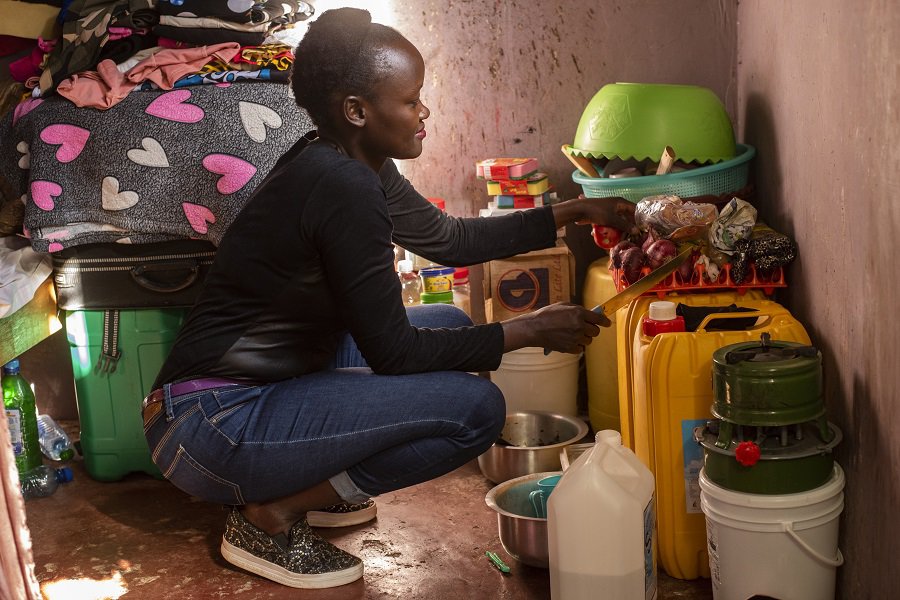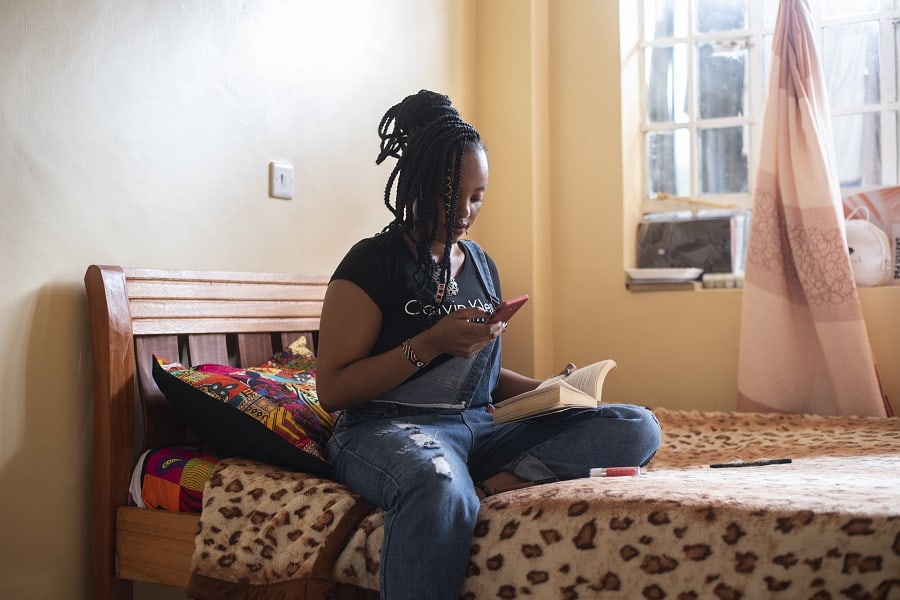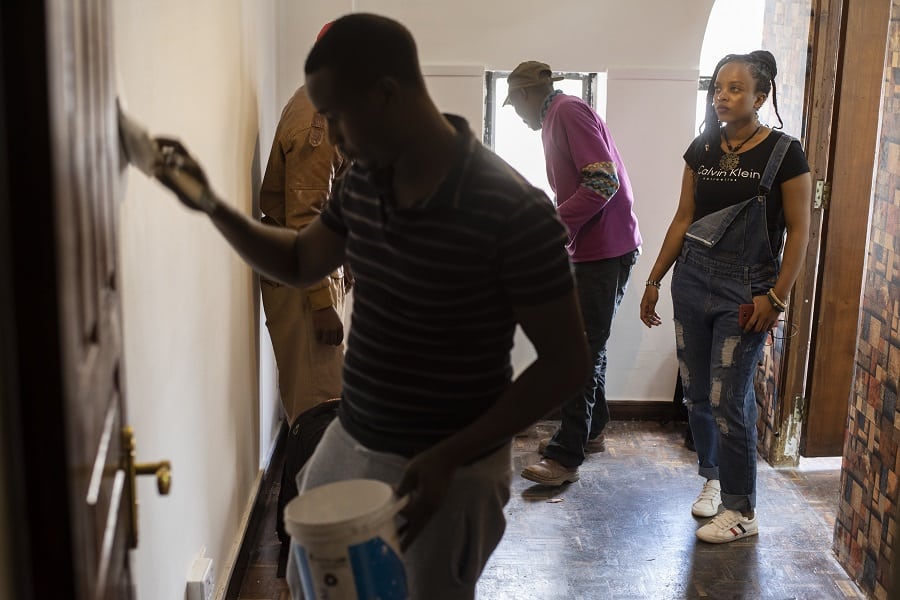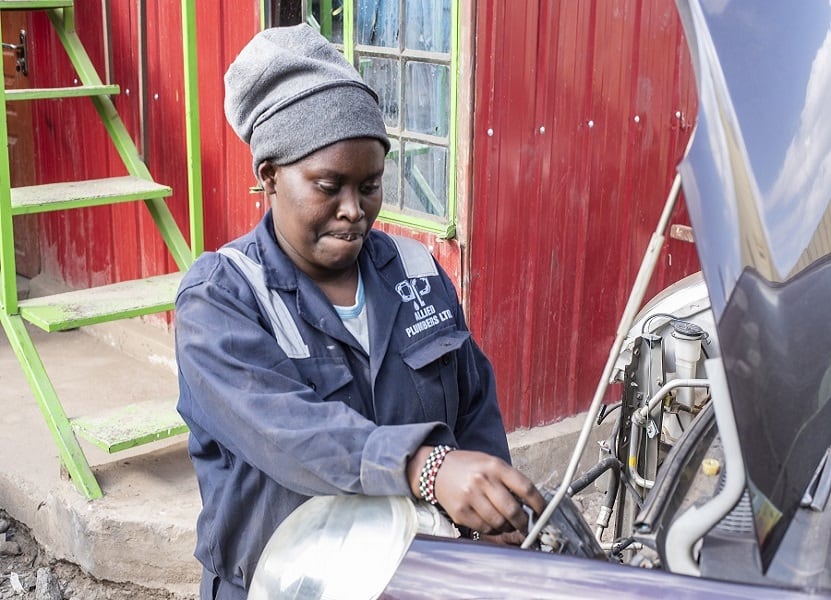This website uses cookies so that we can provide you with the best user experience possible. Cookie information is stored in your browser and performs functions such as recognizing you when you return to our website and helping our team to understand which sections of the website you find most interesting and useful.
Kenya is home to the fourth largest HIV epidemic in the world. In 2016, new infections among young women (ages 15-24) were 44% higher than among young men, with poverty and gender inequality driving the epidemic. The African Centre for Women, Information and Communications Technology (ACWICT), based in Nairobi, provides young women with vocational training and life skills for achieving financial independence and reducing their vulnerability to HIV.
Ann, 24
Ann struggled to find a job in Nairobi. With only a form 4 certificate, and a seven-year-old child to take care of, she had been unable to secure work.
Ann heard about ACWICT’s DREAMS Innovation Challenge (DREAMS-IC) Vusha Girls Employability Program, which is funded by PEPFAR and managed by JSI. The program is focused on equipping vulnerable young women with employer demand-driven skills in fields like information technology (IT), food service, plumbing, and mechanics, and then linking them to jobs.
Ann decided to enroll in the training to become a Motor Vehicle Mechanic. Ann shares, “At the training, there were only three girls, and the rest were men, which made it challenging. The men believed that we weren’t good enough. Therefore, I decided to show them that I can do better than them.”
After Ann completed the training, ACWICT helped her find an internship at a mechanic shop. “Now, that I have experience with lots of different cars, I am confident that I will always find a job,” says Ann.
Praxidies, 23
Praxidies moved to Nairobi with her son in search of a better future. She enrolled in the Vusha Girls Employability Program and received training in food and beverage services.

Currently, Praxidies is working for a fast food restaurant in Nairobi, but she has bigger plans. She shares, “ACWICT were not only training us but also supporting us to find a job. My dream job is to be a chef in a restaurant.”
Grace, 22
Grace grew up in Maralal, a small town in Kenya. In 2014, when she finished high school, she fled to Nairobi to avoid a forced marriage and female circumcision. When Grace arrived, however, she struggled to find a proper job.

A friend introduced Grace to the Vusha Girls Employability Program and she decided to enroll. Grace started a three-month training program in IT. She also learned about financial and life skills, entrepreneurship, health, and how to protect herself against HIV. For example, she learned about pre-exposure prophylaxis (PrEP), a daily dose of antiretroviral medication demonstrated to be effective in preventing HIV infection.
Grace shares, “Before the DREAMS-IC, I used to hear that people took PrEP to prevent HIV, but I did not know how to access it or know about other HIV prevention methods.”

“Initially, I was really shy. However, with the skills taught to me from the program and with the support from the staff, I have become confident and feel comfortable speaking up,” says Grace.
Because of the skills she learned, Grace was able to open her own business in interior design and met her first clients through a DREAMS event. Grace shares, “They (ACWICT) were always here for us. It felt like a home…a home where you can get knowledge.”
.
The DREAMS-IC Vusha Girls Employability Program has trained 1,184 young women and placed 576 of them – like Grace, Ann, and Praxidies – in new or better employment, with skills and opportunities to become financially independent and stay HIV-free.
To learn more about DREAMS-IC, download our fact sheet.
[1] http://www.unaids.org/sites/default/files/media_asset/Global_AIDS_update_2017_en.pdf
[2] http://www.unaids.org/sites/default/files/media_asset/Global_AIDS_update_2017_en.pdf
Photo credit: Lambert Coleman / Hans Lucas



